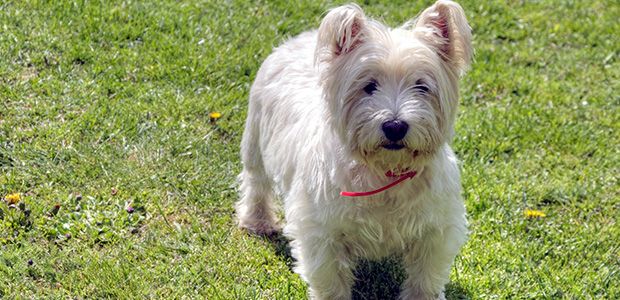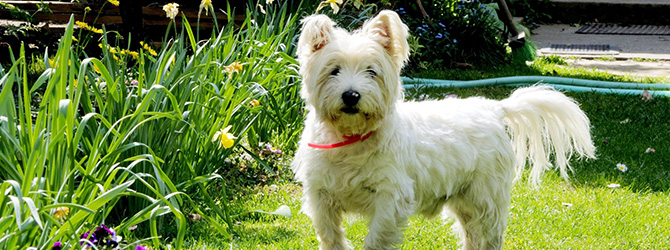The West Highland White Terrier: thinking of getting a Westie?
West Highland White Terriers, more commonly known as Westies, are typical terriers – full of energy with a strong desire to hunt and to dig.
Let’s take a closer look at the Westie.
Place of origin: The Scottish Highlands
How big do Westies get? 25 – 28cm
How heavy are Westies? 7 – 9kg
Westie Life Expectancy: 12 – 17 years
Colour: White
Please note: A dog’s exercise, training/stimulation and grooming requirements can depend on several factors such as age and health. The same goes for ongoing costs of ownership. For advice on one specific dog, we always advise chatting with a vet.
How much exercise does a Westie need?
Despite their modest size, Westies have lots of energy and will need two walks every day, interspersed with high-energy play time.
Westies were originally bred as hunting dogs and the hunter’s instincts remain with them to this day. When out walking, they may be easily distracted by anything they mistake for prey, so it’s a good idea to keep them on the lead until you reach a secure area.
Westies also love to dig, so make sure your garden is securely fenced and don’t let your Westie out without supervision.
Training: how to train a Westie
Westies are independent and full of confidence. If you’re training more than one Westie, be advised that they’ll more likely be influenced by each other than by you, so in these cases obedience training is even more important.
Begin training when your Westie is young, and always use positive reinforcement. With plenty of this, your Westie will be perfectly trained in no time.

Grooming: do Westies shed?
A Westie’s coat is usually easy enough to look after. They naturally repel dirt and water, and you’ll only need to brush your Westie on a weekly basis.
Your Westie will benefit from having their coat trimmed a few times a year, and you’ll only need to bathe them when they’re dirty.
Complete your Westie’s grooming routine with regular tooth brushing, nail clips and ear checks.
Westie temperament, socialising and ideal home environment
Westies are bold, fun and intelligent. They love nothing more than their owner’s company and are friendly with most people, including children.
They’re not the most affectionate towards smaller animals but, providing they’re well socialised from a young age, you should find that your Westie gets along with other pets just fine.
Your Westie will make a loyal and loving family pet. They’re full of character and will be just as comfortable in a small flat as they would in a spacious stately home, making them good companions for city dwellers.
Cost of owning a Westie
When considering the lifetime cost of owning a Westie, remember to take into account:
- Breed-specific food
- Veterinary care
- Pet insurance
- Kennels or dog sitters
- Grooming costs
- Toys and equipment
Need more info?
For more info on finding the best dog breed for you and your lifestyle, have a chat with your vet.
Find your nearest vet using our Find a Vet page, or speak to a vet online using Online Vets.

